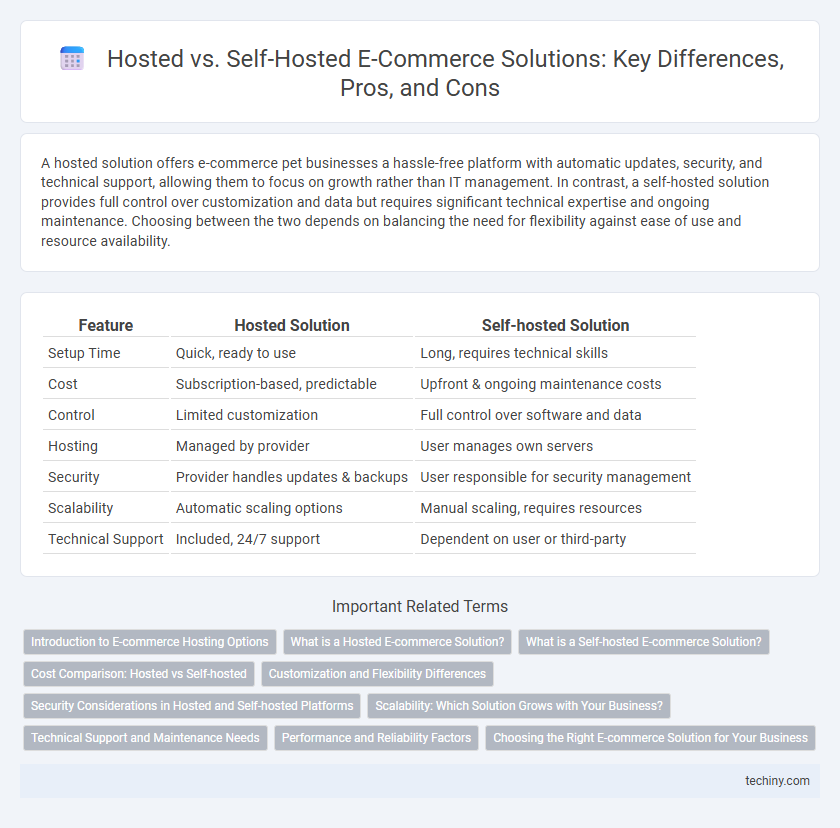A hosted solution offers e-commerce pet businesses a hassle-free platform with automatic updates, security, and technical support, allowing them to focus on growth rather than IT management. In contrast, a self-hosted solution provides full control over customization and data but requires significant technical expertise and ongoing maintenance. Choosing between the two depends on balancing the need for flexibility against ease of use and resource availability.
Table of Comparison
| Feature | Hosted Solution | Self-hosted Solution |
|---|---|---|
| Setup Time | Quick, ready to use | Long, requires technical skills |
| Cost | Subscription-based, predictable | Upfront & ongoing maintenance costs |
| Control | Limited customization | Full control over software and data |
| Hosting | Managed by provider | User manages own servers |
| Security | Provider handles updates & backups | User responsible for security management |
| Scalability | Automatic scaling options | Manual scaling, requires resources |
| Technical Support | Included, 24/7 support | Dependent on user or third-party |
Introduction to E-commerce Hosting Options
E-commerce hosting options include hosted and self-hosted solutions, each offering unique benefits for online store management. Hosted solutions provide a fully managed environment with integrated security, updates, and scalability, ideal for businesses seeking simplicity and quick deployment. Self-hosted solutions allow full control over customization and server configurations but require technical expertise for maintenance, security, and performance optimization.
What is a Hosted E-commerce Solution?
A hosted e-commerce solution is a cloud-based platform where the provider manages all technical aspects such as server maintenance, security, and software updates, allowing businesses to focus on sales and marketing. It offers seamless scalability, integrated payment gateways, and customizable templates without the need for extensive IT expertise. This solution is ideal for small to medium-sized businesses seeking a quick, reliable, and low-maintenance online store setup.
What is a Self-hosted E-commerce Solution?
A self-hosted e-commerce solution is a platform where businesses purchase software and install it on their own servers, giving them full control over customization, security, and data management. This approach enables advanced flexibility for integrating third-party tools, modifying the site's code, and scaling according to specific business needs. Popular self-hosted platforms include Magento, WooCommerce, and OpenCart, which require technical expertise to manage infrastructure and maintain updates.
Cost Comparison: Hosted vs Self-hosted
Hosted e-commerce solutions typically involve a subscription fee that covers hosting, security, and maintenance, resulting in predictable monthly costs. Self-hosted solutions require an upfront investment in server infrastructure, ongoing expenses for security patches, updates, and potential hiring of technical staff, which can lead to variable and sometimes higher total costs over time. Companies must evaluate their budget flexibility and long-term scalability when comparing the consistent expense model of hosted solutions to the potentially fluctuating costs of self-hosted platforms.
Customization and Flexibility Differences
Hosted e-commerce solutions provide limited customization options due to predefined templates and restricted access to the backend code, making them ideal for businesses seeking quick deployment with minimal technical expertise. Self-hosted solutions offer full control over customization and flexibility, allowing businesses to tailor every aspect of their online store, including design, functionality, and integrations, to meet unique needs. The trade-off involves higher initial setup complexity and ongoing maintenance responsibility compared to the ease of use found in hosted platforms.
Security Considerations in Hosted and Self-hosted Platforms
Hosted e-commerce solutions offer robust, vendor-managed security protocols including automatic updates, SSL certificates, and data backups, reducing the risk of breaches and compliance issues. Self-hosted platforms provide complete control over security measures, allowing customization of firewalls, encryption, and access controls, but require dedicated IT expertise to proactively manage vulnerabilities and prevent cyber attacks. Both options demand vigilant monitoring, but hosted environments typically ensure faster response times for security patches due to centralized management.
Scalability: Which Solution Grows with Your Business?
Hosted solutions offer seamless scalability by automatically handling traffic spikes and resource allocation, making them ideal for rapidly growing e-commerce businesses. Self-hosted solutions provide full control over infrastructure but require manual upgrades and capacity planning, which can hinder quick scaling during peak demand. Choosing between hosted and self-hosted depends on balancing the need for flexibility and control versus ease of growth and management.
Technical Support and Maintenance Needs
Hosted solutions provide dedicated technical support and routine maintenance managed by the service provider, reducing the need for in-house IT resources and allowing faster issue resolution. Self-hosted solutions require significant internal technical expertise to handle updates, security patches, and system troubleshooting, increasing maintenance complexity and overhead costs. Businesses seeking hassle-free, continuous support often prefer hosted platforms, while self-hosted options suit organizations with strong IT teams and customized infrastructure demands.
Performance and Reliability Factors
Hosted e-commerce solutions offer optimized performance through dedicated infrastructure and regular maintenance managed by providers, ensuring high uptime and scalability during traffic spikes. Self-hosted solutions demand robust server management and continuous monitoring to maintain reliability, with performance heavily dependent on in-house technical expertise and hardware quality. Choosing between hosted and self-hosted options hinges on balancing control against guaranteed uptime and the ability to swiftly adapt to fluctuating customer demand.
Choosing the Right E-commerce Solution for Your Business
Hosted e-commerce solutions offer ease of setup, automatic updates, and security managed by the provider, ideal for businesses seeking lower upfront costs and minimal technical maintenance. Self-hosted solutions provide full control over customization, scalability, and data ownership, making them suitable for businesses with specific operational requirements and in-house technical expertise. Evaluating factors such as budget, customization needs, security control, and long-term scalability helps determine the optimal e-commerce platform tailored to your business growth.
Hosted Solution vs Self-hosted Solution Infographic

 techiny.com
techiny.com